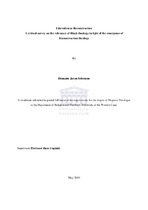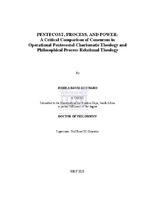| dc.description.abstract | This thesis delves into the well-documented link between Black Theology and liberation,
particularly in the context of liberation theology in South Africa. Black Theology emerged as
a direct response to the inadequacy of traditional Western theology in addressing the plight of
Black oppressed communities living in racially stratified societies. As a root metaphor for
Black theological reflection, liberation serves as a normative association, historically
intertwined with emotions of anger and discontent.
Moreover, this investigation emphasises the importance of Allan Boesak's vision for authentic
liberation and its resonance with the broader Black theological tradition. The study further
elucidates how Boesak's theological framework has engendered meaningful discussions and
critical reflections among theologians, scholars, and activists, as they endeavour to navigate
the complexities of post-apartheid society.
Focusing on literature that assumes liberation as the basis for Black theological discourse, this
study examines the relevance of Black Theology in the post-apartheid era, where some voices
advocate for its abandonment in favour of theological approaches considered more suitable for
the democratic context. However, this thesis argues for a comprehensive exploration of Ubuntu
Theology as an emerging paradigm, drawing from African philosophical notions emphasising
interconnectedness among human beings, irrespective of social markers that may separate
them. Ubuntu Theology embodies the profound concept of ‘I am because we are’ and ‘I am
because you are.’
The work of Desmond Tutu, a prominent proponent of Ubuntu Theology, serves as a
cornerstone for this research. Tutu's oeuvre offers invaluable insights into the understanding
and concretisation of Ubuntu Theology's significance. By integrating Tutu's perspectives, this
study seeks to illuminate the intricate relationship between Black Theology and Ubuntu
Theology, offering a contextualised examination of liberation and connectedness within
theological discourse. | en_US |




